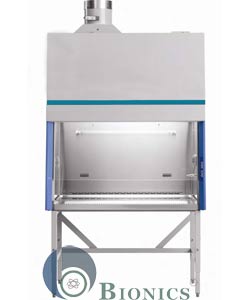What Might Be Next In The Class 2 Biosafety Cabinets
What Might Be Next In The Class 2 Biosafety Cabinets
Blog Article
Class 2 Biosafety Cabinets: Essential Equipment for Laboratory Safety and Microbiological Containment

Modern laboratories prioritise safety for workers, materials, and environments. Whether it's handling live pathogens or sensitive diagnostics, biosafety cabinets are central to preventing cross-contamination and safeguarding personnel.
Of all types, Class 2 cabinets are most commonly used due to their efficiency and versatility. These units are crucial for working with moderate-risk organisms and sensitive samples.
Understanding Biosafety Cabinets
Biosafety cabinets are airflow-controlled workspaces engineered for microbiological safety. They use HEPA filtration to remove contaminants from incoming and outgoing air.
These units are generally classified into Classes I, II, and III depending on airflow and application needs. Among these, Class 2 cabinets are the most versatile and commonly used.
Defining Class 2 Biosafety Cabinets and Their Role
Class 2 Biosafety Cabinets ensure safety on all fronts—personnel, workspace, and biological material. They utilise downward laminar airflow within a sealed system.
Both incoming and outgoing air are HEPA-filtered to maintain sterility and prevent leaks. These cabinets are suited for clinical, research, and pharmaceutical lab applications.
What Makes Class 2 Cabinets Effective in Labs
A Class 2 microbiological safety cabinet includes several integrated safety mechanisms such as:
• Medical-grade filters for capturing contaminants
• Uniform downward airflow to protect the sample zone
• Negative pressure barriers to prevent leakage
• Optional UV lights for overnight sterilisation
• Noise-reducing construction for better working conditions
• Clear front panel for visibility and safety
These elements ensure safety, comfort, and efficiency in day-to-day lab tasks.
Applications in Research and Healthcare
Class 2 Biosafety Cabinets are key equipment in healthcare, molecular biology, and quality control. They are critical for DNA/RNA extraction, pathogen culture, and molecular assays.
Whether in hospitals or drug manufacturing, these units are essential for clean procedures.
Advantages of Installing Class 2 Cabinets in Your Lab
Using Class 2 cabinets offers multiple advantages including operator protection and experimental reliability:
• Protects the integrity of lab work
• Prevents accidental exposure to infectious materials
• Ensures filtered air is safe for release or recirculation
These cabinets support biosafety goals while improving lab productivity.
Regulatory Standards for Class 2 Cabinets
Top manufacturers build Class 2 cabinets in accordance with strict international guidelines. Class 2 units are sub-classified as A1, A2, B1, and B2—with each type offering Biosafety Cabinets different air handling systems.
• Type A2: Ideal for general-purpose labs
• Type B2: Suited for labs dealing with toxic agents
Choosing the correct subtype is vital for achieving optimal safety and functionality.
Choosing the Right Biosafety Cabinet
Before purchasing, consider:
• The biosafety level required (BSL-1, BSL-2, or BSL-3)
• Cabinet dimensions, ducting needs, and room layout
• Operational costs and technical support options
• Service network and part availability
Working with reliable manufacturers provides peace of mind and technical guidance.
Best Practices for Using Class II Biosafety Cabinets
For optimal results:
• Minimise airflow interference during operation
• Schedule regular performance checks
• Ensure operators follow best practices
Operational best practices include:
• Use gloves, gowns, and face shields while operating
• Work calmly to prevent airflow disturbances
• Decontaminate surfaces before and after use
• Use UV lights only when cabinet is off and unoccupied
Why Class 2 Cabinets Are a Must-Have in Labs
Class 2 biosafety cabinets are vital equipment in laboratories dealing with biohazards. They ensure contamination-free experiments and personnel safety.
From biotech and diagnostics to academia and pharma, Class II cabinets copyright the highest biosafety levels. When investing in a biosafety cabinet, choose performance and reliability over cost-cutting—because lab safety is non-negotiable. Report this page